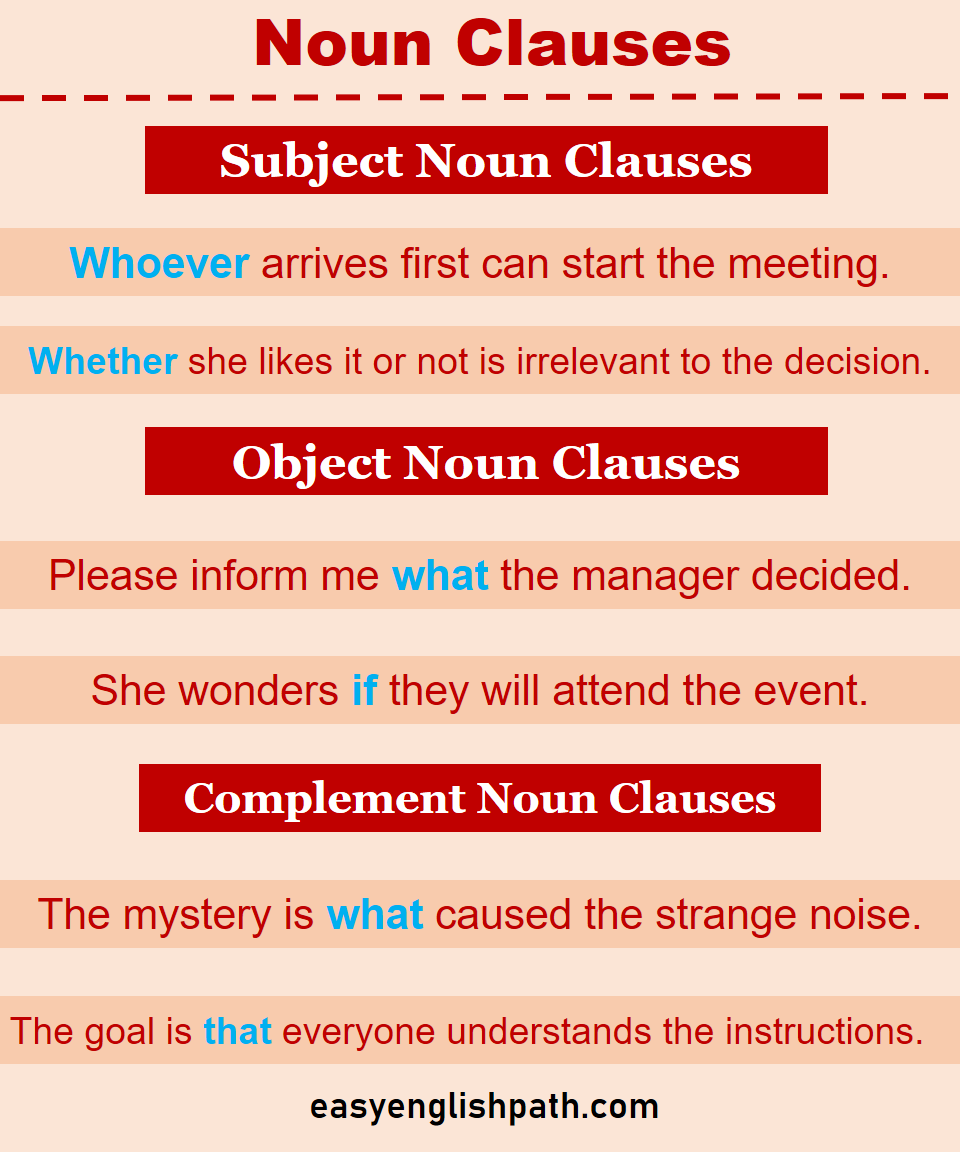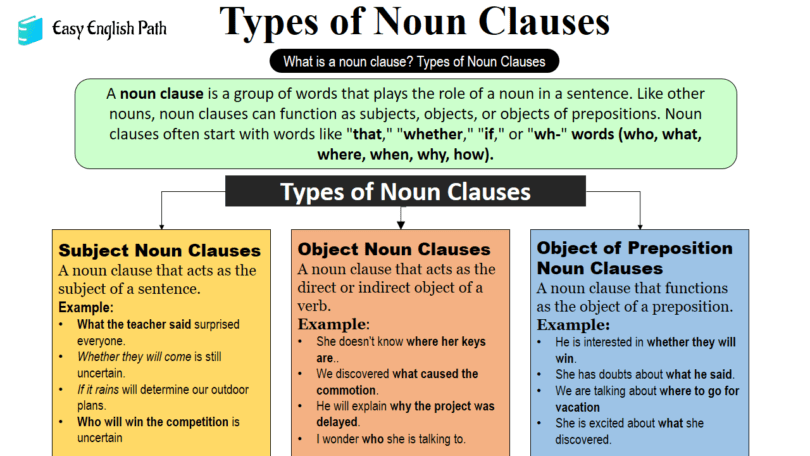Noun Clauses are groups of words that work like a noun in a sentence. They can be a subject, object, or complement but cannot stand alone as a complete sentence. These clauses often start with words like that, what, who, where, why, or how. Learning Noun Clauses helps improve English grammar and sentence structure. They make sentences more detailed and meaningful in both speaking and writing.
What is a Noun Clause?
A noun clause is a group of words that acts as a noun in a sentence. It can be a subject, object, or complement, but it cannot stand alone as a complete sentence. It depends on the main clause to make sense.
- We can’t decide which movie to watch.
- He doesn’t know if he should apply for the job.
- She understands that studying is important.
Types of Noun Clauses
There are three main types of noun clauses:
- Declarative Noun Clauses
- Interrogative Noun Clauses
- Relatives Noun Clauses
1. Declarative Noun Clauses:
Declarative noun clauses make a statement or declaration and act as the subject or object in a sentence. They often begin with that, what, or if and help clarify the subject.
- The fact that dogs are loyal is widely known.
- I hope that we succeed in our endeavors.
2. Interrogative Noun Clauses:
Interrogative noun clauses ask questions or seek information in a sentence. They begin with who, what, where, why, how, etc., and often function as direct objects or help inquire about something.
- Could you tell me what time the train departs?
- She wonders why he didn’t attend the event.
3. Relative Noun Clauses:
Relative noun clauses give extra information about a noun or pronoun in the main clause. They start with who, whom, whose, which, or that.
- She showed me the book that she had purchased.
- The car, which was parked illegally, was towed away.
Subordinating Conjunctions Used in Noun Clauses
Noun clauses are usually introduced by subordinating conjunctions, which help establish a relationship between the main clause and the dependent noun clause. Below are some common subordinating conjunctions used to introduce noun clauses:
1. That
The most commonly used subordinating conjunction, often introducing noun clauses in various contexts. In informal speech, it is sometimes omitted.
- He believes that she will succeed.
2. Whether/If
Used when the noun clause expresses doubt, uncertainty, or a choice between possibilities.
- I’m not sure whether/if it will rain.
3. Wh- Words
Certain relative pronouns such as who, whom, whose, what, where, when, why, and how can also introduce noun clauses.
- I wonder where they went.
Functions of Noun Clauses in Sentences
Noun clauses perform various functions in a sentence. Here are some of the common roles they fulfill:
1. Subject
A noun clause can act as the subject of a sentence, replacing a regular noun. It answers the question “What is it?”
- What you said surprises me.
2. Direct Object
A noun clause can function as the direct object of a verb, answering “What?” or “Who?” after the verb.
- She doesn’t know what he wants.
3. Indirect Object
A noun clause can serve as the indirect object of a verb, indicating to whom or for whom an action is performed.
- He revealed who took the money.
4. Object of a Preposition
A noun clause can function as the object of a preposition, providing information about place, time, or other aspects.
- She’s worried about when they will arrive.
5. Complement of a Verb
A noun clause can act as the complement of a verb, completing its meaning and adding details to the subject.
- His biggest fear is that he will fail.
Noun Clauses and Adjective Clauses
| Feature | Noun Clause | Adjective Clause |
|---|---|---|
| Definition | A group of words that acts as a noun in a sentence. | A group of words that describes a noun (acts as an adjective). |
| Function | Works as a subject, object, or complement. | Modifies a noun or pronoun in the sentence. |
| Introduced by | Words like that, what, who, where, why, how. | Relative pronouns like who, whom, whose, which, that. |
| Example Sentence | I know what she said. (Acts as object) | The book that you gave me is interesting. (Describes “book”) |
| Can Stand Alone? | No, it depends on the main clause. | No, it depends on the noun it describes. |
Examples of Noun Clause
- What she said made me laugh.
- I don’t know what he wants for his birthday.
- Wherever you go, I will follow.
- I heard that you won the competition.
- Whoever finishes first gets a prize.
- The fact that she lied surprises me.
- I wonder who will be the next president.
- I believe whatever doesn’t kill you makes you stronger.
- The teacher asked if we understood the lesson.
- I’m afraid of what might happen next.

FAQS with Noun Clause
1. What is the main difference between a noun clause and an adjective clause?
A noun clause acts as a noun (subject, object, or complement), while an adjective clause describes a noun like an adjective.
2. How do I identify a noun clause in a sentence?
A noun clause often starts with that, what, who, where, why, or how and functions as a subject or object.
3. What words introduce adjective clauses?
Adjective clauses begin with who, whom, whose, which, or that and modify a noun.
4. Can a sentence have both a noun clause and an adjective clause?
Yes! Example: I know what she said (noun clause) about the book that you gave me (adjective clause).
You May Also Like





